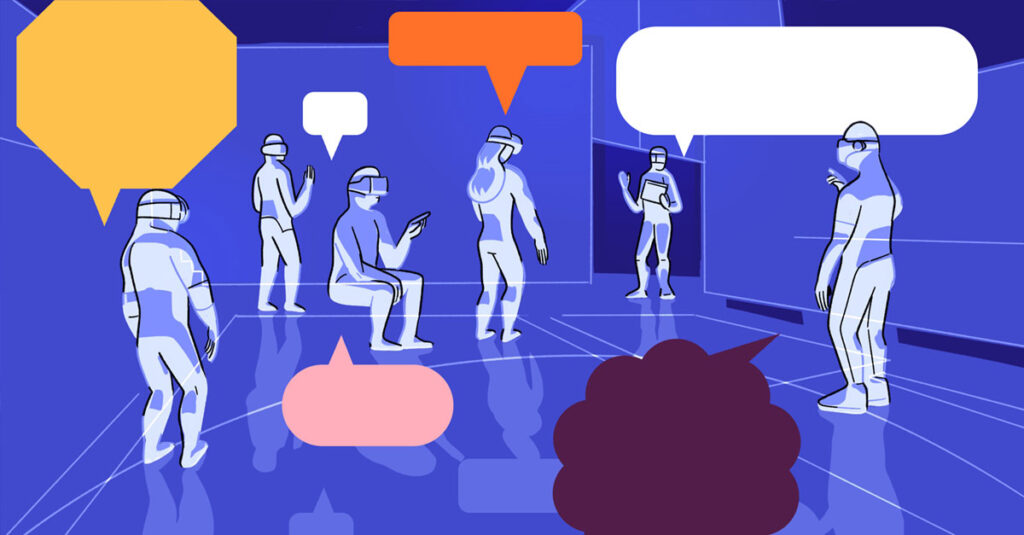We may not know yet exactly what the metaverse will look like. But one thing’s for sure: It’s been one of the most discussed trends in the tech space.
As of now, the metaverse — predicted to be an $800 billion market by 2024 — is depicted by Meta and Microsoft as a virtual environment for playing games, working, and shopping.
In this context, video games are the most logical use case. After all, gamers are already immersed in a mixed reality, virtual world when playing.
These immersive experiences will go even deeper as the metaverse offers the ability to invite friends from social media, interact more personally with other gamers, and use in-game customer support avatars. In fact, an avatar “handler” has a starring role in the popular Amazon Prime sci-fi comedy “Upload”.
During a recent Unbabel roundtable with gaming executives, guests were eager to discuss how the metaverse customer experience will impact customer engagement, customer support, and translation and localization. Here’s a rundown of their thoughts.
Customer support and personalization in metaverse gaming
The main customer service challenge in metaverse gaming is how to assist players without forcing them to remove their virtual reality/augmented reality headsets, and re-enter the physical world for support.
Maybe that solution comes in the form of customer support avatars (à la the Nora character in “Upload”) that integrate seamlessly into the game. Whatever the in-game solution is for metaverse gaming, these are the two main customer support goals, according to our gaming CX leaders:
-
Support must be easily accessible within the game to quickly resolve issues
-
It must also stay in the background to keep the virtual experience fluid for players
One new product offering for metaverse customer support is Metashift from Helpshift. With Metashift, users can chat with a virtual agent without leaving their virtual space. Tools like Metashift point to a digital world where immersive customer support will be the standard in virtual environments.
Personalization for quick, conversational support
Having a 360-degree view of a customer’s contact information, support history, and communication preferences will also be critical in metaverse gaming, where players need help quickly and without disruption.
While it’s important to have players’ information at hand, this poses the next challenge: Are your customer service agents able to communicate with them clearly despite language barriers?
This challenge is compounded by the fact that gamers are young. Interpreting the lingo of teenagers and young adults is a customer support challenge unto itself, but delivering a personalized experience for them gets more complicated when young gamers have their own lexicon entirely.
Some gaming customer support teams leverage translation technology to deliver a better CX to young customers. But even with AI-based translation tools, brands will require human refinement for translations.
Which brings us to another vital aspect of metaverse gaming: Creating a new world without language barriers via high-quality translations.

Translation and localization in metaverse gaming
With more than 3 billion gamers worldwide, multilingual customer support is essential. But translation and localization for player support, marketing content, and the game itself are riddled with challenges that will carry over into the metaverse.
For one thing, video games include made-up words specific to the game’s fantasy world and plot. Take, for example, the game “Metal Gear Rising: Revengeance” by Konami. “Revengeance” is not a real word so it’s difficult to translate correctly from, say, English to German.
Generic machine translation tools such as Google Translate would likely translate “revengeance” by the letter and its meaning would get lost in translation. These neologisms (new words) require the expertise of human editors and custom glossaries for suitable translations.
The need for human-refined AI translations
In metaverse gaming, the quality of translations will make or break customer-centric brands entering new global markets. Having human translators in the loop will help guarantee that the aforementioned made-up words, teenage lingo, and regional slang will get translated clearly.
And not only do gaming brands need to support multiple languages with high-quality translations, but the translations must be turned around in near real-time to reduce interruption to the gaming experience.
To this end, metaverse gaming will be another use case for combining machine and man-made translations. Machine translation tools deliver fast translations for chats, FAQs, emails, and website and marketing messaging content; human translators will scour text for cultural references and made-up words. A man/machine approach is the only way to deliver translations at the speed, scale, and quality that gaming demands.
Localization to engage international gamers
In addition to delivering accurate and timely translations, it’s important to localize a game’s marketing and customer support content. This allows brands to integrate proper cultural references and remove images that may be offensive or confusing in certain cultures.
Localization could equate to reducing gory game visuals for countries with a lower tolerance for violence. Additionally, some gaming brands have incorporated music into games to appeal to certain cultures and demographics, and that will only continue in the metaverse. Fortnite, for example, has hosted virtual events for Ariana Grande and Marshmello.
Connect with metaverse gamers now
We don’t know what the metaverse will ultimately look and feel like inside the virtual real estate of a game. But we do know website and customer support content will need to be translated and localized in a timely manner, and at the highest quality to provide satisfying customer journeys.
This is where Unbabel can be an invaluable partner. Our language operations platform excels at localizing a game’s website, marketing, and customer support content using human-refined artificial intelligence. We also create custom glossaries of the words and lingo used by the brand and translate them accurately across every target language.
As more gamers enter the metaverse via VR headsets, brands have a golden opportunity to apply real-world gaming CX and CS best practices to connect with international players in ways that are fast, conversational, and convenient. Brands with poor-quality translations and intrusive customer support will quickly get left behind as metaverse gaming accelerates into the future.
Unbabel’s solution combines advanced artificial intelligence with human editors, for fast, efficient, high-quality translations that get smarter over time.












